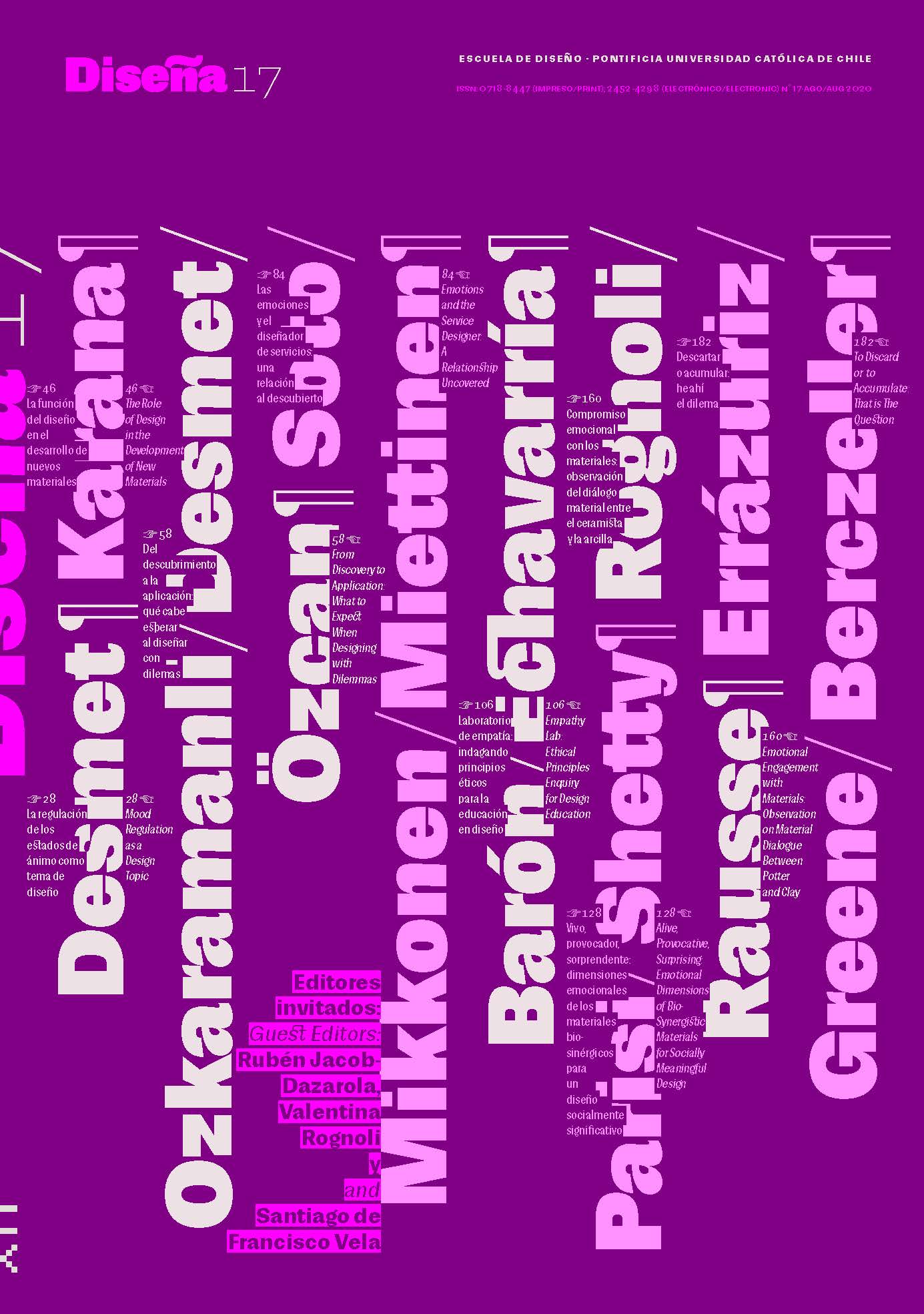Descartar o acumular: he ahí el dilema
Contenido principal del artículo
Resumen
Durante los últimos años han cobrado fuerza las tendencias minimalistas de organización del hogar, que tienen a la conocida organizadora japonesa Marie Kondo como principal “gurú”. Sus postulados promueven la construcción de espacios domésticos ideales a partir de la generación de vínculos afectivos con las cosas, llamando al descarte de todo lo que no produzca felicidad (spark joy). A partir de una investigación realizada en hogares de Santiago, destinada a comprender las diversas formas en que se guardan, valoran y disponen los objetos en las casas, este artículo reflexiona sobre las formas de concebir y habitar lo doméstico en Chile. Se discute la pertinencia y adaptación de estas nuevas tendencias minimalistas que llaman al descarte en hogares que, contrariamente, parecen orientarse por una ética del cuidado y la conservación de sus objetos domésticos, valorando su condición temporal y dinámica, así como su participación en una ecología de bienes.
Descargas
Detalles del artículo

Este obra está bajo una licencia de Creative Commons Reconocimiento-CompartirIgual 4.0 Internacional.
NOTA DE COPYRIGHT
Todos los contenidos de esta edición electrónica se distribuyen bajo licencia Creative Commons de “Atribución-Copartirigual 4.0 Internacional” (CC-BY-SA). Cualquier reproducción total o parcial del material deberá citar su procedencia.
Los derechos de las imágenes publicadas pertenecen a sus autores, quienes otorgan a Diseña la licencia para su uso. La gestión de los permisos y la autorización de publicación de las imágenes (o de cualquier material) que contenga derechos de autor y sus consecuentes derechos de reproducción en esta publicación es de exclusiva responsabilidad de los autores de los artículos.
Citas
ARIZTÍA, T., AGLONI, N., & PELLANDINI‐SIMÁNYI, L. (2018). Ethical Living: Relinking Ethics and Consumption through Care in Chile and Brazil. The British Journal of Sociology, 69(2), 391-411. https://doi.org/10.1111/1468-4446.12265
BECKER, J. (2018). The Minimalist Home: A Room-by-Room Guide to a Decluttered, Refocused Life. WaterBrook.
CARDELL, K. (2017). Modern Memory-Making: Marie Kondo, Online Journaling, and the Excavation, Curation, and Control of Personal Digital Data. a/b: Auto/Biography Studies, 32(3), 499-517. https://doi.org/10.1080/08989575.2017.1337993
CASSINGER, C. (2010). Retailing Retold: Unfolding the Process of Image Construction in Everyday Practice. Lund Studies in Economics and Management.
CWERNER, S. B., & METCALFE, A. (2003). Storage and Clutter: Discourses and Practices of Order in the Domestic World. Journal of Design History, 16(3), 229-239. https://doi.org/10.1093/jdh/16.3.229
DION, D., SABRI, O., & GUILLARD, V. (2014). Home Sweet Messy Home: Managing Symbolic Pollution. Journal of Consumer Research, 41(3), 565-589. https://doi.org/10.1086/676922
DOMÍNGUEZ RUBIO, F. (2016). On the Discrepancy between Objects and Things: An Ecological Approach: Journal of Material Culture, 21(1), 59–86. https://doi.org/10.1177/1359183515624128
DOUGLAS, M. (1973). Pureza y peligro. Un análisis de los conceptos de contaminación y tabú. Siglo XXI.
EDENSOR, T. (2005). Waste Matter—The Debris of Industrial Ruins and the Disordering of the Material World: Journal of Material Culture, 10(3), 311-332. https://doi.org/10.1177/1359183505057346
ERRÁZURIZ, T. (2018). Estación Terminal. La vida de las cosas en la vivienda rural. In F. Alarcón (Ed.), Vivienda Rural en el Valle Central (pp. 106-113). ARQ.
ERRÁZURIZ, T. (2019). “Till Death Do Us Part”: The Making of Home Through Holding onto Objects. In F. Martínez & P. Laviolette (Eds.), Repair, Brokenness, Breakthrough: Ethnographic Responses (pp. 45-66). Berghahn.
GFK CHILE. (2019). Estilos de vida de los grupos socioeconómicos en Chile. https://www.anda.cl/wp-content/uploads/2019/05/GfK_GSE_190502_FINAL.pdf
GREENE, R. (2020). A Line in the Sand. Racism, Elite and Comfort in Argentine Gated Communities [Unpublished doctoral dissertation. University of London].
GREGSON, N., METCALFE, A., & CREWE, L. (2009). Practices of Object Maintenance and Repair: How Consumers Attend to Consumer Objects within the Home. Journal of Consumer Culture, 9(2), 248–272. https://doi.org/10.1177/1469540509104376
HARRIS, E., & NOWICKI, M. (2020). “GET SMALLER”? Emerging Geographies of Micro-living. Area, 00(1), 1-9. https://doi.org/10.1111/area.12625
KILROY-MARAC, K. (2016). A Magical Reorientation of the Modern: Professional Organizers and Thingly Care in Contemporary North America. Cultural Anthropology, 31(3), 438-457. https://doi.org/10.14506/ca31.3.09
KONDO, M. (2014). The Life-changing Magic of Tidying Up: The Japanese Art of Decluttering and Organizing. Random House.
KONDO, M. (2016). Spark Joy: An Illustrated Master Class on the Art of Organizing and Tidying Up. Ten Speed Press.
KONDO, M. (2020). KonMari Is Not Minimalism. KonMari | The Official Website of Marie Kondo. https://konmari.com/konmari-is-not-minimalism/
LESLIE, D., & REIMER, S. (2003). Gender, Modern Design, and Home Consumption: Environment and Planning D: Society and Space, 21(3), 293–316. https://doi.org/10.1068/d337
LEWIS, T., & POTTER, E. (2011). Ethical Consumption: A Critical Introduction. Routledge.
LÖFGREN, O. (2017). Mess: On Domestic Overflows. Consumption Markets & Culture, 20(1), 1-6. https://doi.org/10.1080/10253866.2016.1158767
LOREAU, D. (2016). L’art de la Simplicité: How to Live More with Less. St. Martin’s Griffin.
LURY, C. (2011). Consumer Culture. Polity.
MAYCROFT, N. (2009). Not Moving Things Along: Hoarding, Clutter and other Ambiguous Matter. Journal of Consumer Behaviour, 8(6), 354-364. https://doi.org/10.1002/cb.298
MILLBURN, J. F., & NICODEMUS, R. (2011). Minimalism: Live a Meaningful Life. Asymmetrical Press.
MURPHY, E. (2018). Less is More Work: A Governmentality Analysis of Authenticity Within Minimalism Discourse [Doctoral Dissertation, Carleton University]. https://doi.org/10.22215/etd/2018-13211
OUELLETTE, L. (2019). Spark Joy? Compulsory Happiness and the Feminist Politics of Decluttering. Culture Unbound: Journal of Current Cultural Research, 11(3-4), 534-550. https://doi.org/10.3384/cu.2000.1525.191108
PENN, B. (2017). The Little Book of Tidying: Declutter your Home and your Life. Gaia.
RUBIN, G. (2019). Outer Order, Inner Calm: Declutter and Organize to Make More Room for Happiness. Harmony.
SOUKUP, R. (2016). Unstuffed: Decluttering Your Home, Mind and Soul. Zondervan.
STRASSER, S. (1999). Waste and Want: A Social History of Trash. Metropolitan.
WEINSWIG, D. (2017). Is Minimalism the New Normal? Marie Kondo Is Expanding KonMari To Organize the World. Forbes. https://www.forbes.com/sites/deborahweinswig/2017/08/09/is-minimalism-the-new-normal-marie-kondo-is-expanding-konmari-to-organize-the-world/
ZALEWSKA, J., & COBEL-TOKARSKA, M. (2016). Rationalization of Pleasure and Emotions: The Analysis of the Blogs of Polish Minimalists. Polish Sociological Review, 196(4), 495-412.

